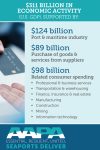AAPA Continues Leading Crane Reshoring Initiatives/Congress Introduces Port Cranes Tax Credit Act of 2025

Without safe, reliable, and affordable cranes, America’s ports cannot move the goods that sustain our economy and support the daily lives of consumers. This is a reality our industry lives and breathes every day. Yet for many years, federal policymakers have overlooked the urgency of reliable access to this essential infrastructure.
Since 2020, during President Trump’s first administration, the U.S. port industry has faced repeated efforts to make foreignmanufactured ship-to-shore (STS) cranes, primarily those from China’s ZPMC, more expensive or even banned outright. While these well intended proposals are often framed as national security measures, in reality, they will only choke up supply chains and drive up costs for ports without providing any viable alternatives. For over five years, the American Association of Port Authorities (AAPA) has worked tirelessly with Congress and federal agencies to educate decision-makers, dispel gross mischaracterizations, and advocate for realistic solutions that strengthen both security and supply chains.
After extensive engagement across the maritime, manufacturing, and federal policy community, AAPA is proud to support a sensible alternative: the Port Cranes Tax Credit Act of 2025 (H.R. 4589). Introduced on July 22, 2025, by Representatives Mike Ezell (R-MS4) – Chair of the House Transportation and Infrastructure Subcommittee on Coast Guard and Maritime Transportation, along with Nicole Malliotakis (R-NY11), this legislation offers a constructive pathway forward by incentivizing the domestic production of STS cranes.
In announcing the bill, Rep. Ezell noted that the measure “will incentivize the production and deployment of domestically manufactured cranes, reduce our dependence on adversarial nations, and stimulate investment in American manufacturing and innovation.” He and Rep. Malliotakis were joined by original cosponsors and long-time port champions Representatives Randy Weber (R-TX14/Co-Chair of the Congressional Ports Caucus) and Jen Kiggans (R-VA2). Several days later, Rep. David Rouzer (R-NC7), Chair of the House Transportation and Infrastructure Subcommittee on Highways and Transit, also signed on as a cosponsor.
AAPA President and CEO Cary Davis praised the bill’s introduction, thanking the leads and cosponsors “for recognizing the need for supply-side incentives — not punishments on the demand side through taxes.” Davis described the measure as “a tangible first step toward reshoring key cargo-handling equipment, since there are currently no domestic STS crane manufacturers.”
The bill has already garnered strong support from port leaders across the nation. Richard J. Hendrick, CEO of the Port of Albany and Vice Chair of AAPA’s Board of Directors, joined Paul Anderson, President and CEO of Port Tampa Bay and former AAPA Board Chair, and Bo Ethridge, Port Director at the Port of Pascagoula, in voicing their support. Jon Nass, CEO and Executive Director of the Port of Gulfport, called the bill “legislation that will help ensure America supports critical infrastructure by growing domestic crane manufacturing capacity” and one that “creates a path to bring new skilled jobs to Mississippi while reinforcing our ability to compete globally.”


